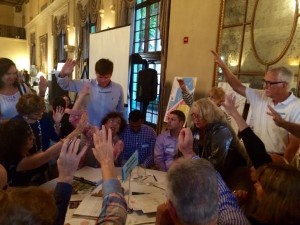Concerned about over-development, zoning changes and traffic congestion, more than 200 lively residents packed into the Alhambra ballroom at the Biltmore Hotel in Coral Gables on Wednesday evening to debate the future of Coral Gables.
Coral Gables Commissioner Jeannett Slesnick hosted the forum, which included brainstorming sessions covering the North Ponce area, U.S. 1 corridor, downtown Coral Gables, annexations, green spaces and more.
Coral Gables is in the midst of major development, with 40 commercial and residential projects, 2,700 residential units, 1.5 million square feet of office space and 740 hotel rooms in the works.

Table discussion of the U.S. 1 corridor in Coral Gables
Among the projects in the pipeline are the Mediterranean Village at Ponce Circle, 2020 Salzedo and Paseo de la Riviera, the latter of which aims to redefine a portion of the U.S. 1 corridor.
Many residents expressed frustration over plans for the corridor and said the Paseo was “underserving its residents.” They cited traffic congestion, pedestrian safety, increased building heights and loss of parking. In September, the Coral Gables Planning and Zoning board voted to send the Paseo de la Riviera to the city commission without a recommendation.
The city’s population, which doubles during the daytime, is expected to pass 50,000, according to Javier Betancourt, the city’s economic development director.
Here are some of the projects in the development pipeline:
- Mediterranean Village at Ponce Circle: 227 residential units, 180 hotel rooms, 290,000 square feet of office space, 290,000 square feet of retail space, and a conference center
- 2020 Salzedo: 214 residential units, 48,000 square feet of office space
- Lennar Foundation Medical Center: 200,000-square-foot outpatient center
- Merrick Manor: 227 residential units, 19,000 square feet of commercial space
- Paseo de la Riviera: 224 apartments, 10-story hotel, 14,853 square feet of ground floor retail
- Aloft Hotel: 170 rooms
The city will break ground on the $20 million Miracle Mile and Giralda Avenue streetscape improvements early next year. The central business district reported a 9.8 percent office vacancy rate and a 2.1 percent retail vacancy rate for the second quarter of this year, according to Betancourt.
Residents also griped about the changes in parking that the streetscape project will bring to the city’s central business district: parking on the street will be entirely parallel, doing away with the 45-degree-angled spots for more sidewalk space.
Frank Nero, president of Beacon Global Advisors, said that the private and public sectors “need to share a vision.”
“More often than not, cities are not prepared or certain of what they should do because most of the time, they are reactionary,” Nero said. “There are worse things than being the hot new city, but you have to be careful.”
